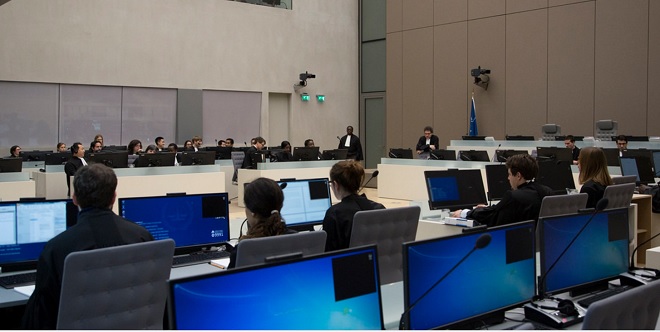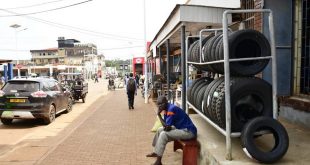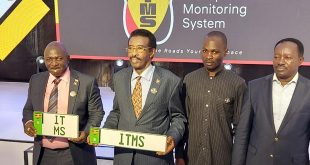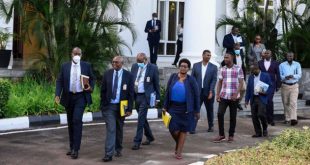
Your Honours,
The Prosecution’s case is that civilian camps for displaced persons were targeted because the LRA, despite its leader’s claim to be fighting for freedom and democracy, viewed the civilian inhabitants of the government protected IDP Camps in Northern Uganda as their enemies.
The LRA’s thinking was simple: it was a case of “if you are not for us, then you are against us.” Any civilian who was unwilling to support their struggle against the government was regarded as an enemy. This amounted to persecution on political grounds – a crime against humanity. It was this persecutory policy that Dominic Ongwen and the fighters that he commanded were implementing. The crimes committed at Pajule, Odek, Lukodi and Abok were simply part of a widespread and systematic attack on the civilian population.
Between July 2002 and December 2005, there were literally hundreds of attacks on civilian targets. These were not just large-scale set-piece attacks on IDP camps. People being driven in minibuses along country roads became the subject of ambushes. Commercial vehicles were stopped and looted. Children on their way to school were abducted. These attacks had a devastating effect upon the ordinary people of Northern Uganda.
The evidence in this case will establish that Dominic Ongwen was directly involved in many of these attacks by the LRA on civilians in Northern Uganda. Part of the case which the Prosecution alleges against him is that he knew that the crimes he committed at Pajule, Odek, Lukodi and Abok were part of the widespread and systematic attack. Allow me to provide you some examples:
- LRA fighters attacked civilians at Ojwii in 2002 on Dominic Ongwen’s orders;
- A 14 year-old boy, abducted in September 2002 from Palabek Gem, recalls Mr Ongwen ordering young children to kill civilian abductees. On one notorious occasion, Dominic Ongwen ordered this boy, and others, to kill an old man by biting him and then stoning him to death;
- Additionally, in 2002 there were attacks on civilians at Atiak and Pader, led or planned by Dominic Ongwen;
- In April 2003, Joseph Kony had been complaining, in radio exchanges with his senior commanders, that the civilian inhabitants of a camp at Lagile had become a “problem.” Dominic Ongwen provided Joseph Kony with the solution for that problem: he attacked the camp at Lagile, burning houses, killing 20 civilians and abducting many others;
- In September 2003, shortly before the Pajule attack, Dominic Ongwen reported over the radio that he had attacked a church mission in Opit;
- In October 2003, Dominic Ongwen played an instrumental role in the charged attack at Pajule;
- In November 2003, Dominic Ongwen was reported in LRA radio traffic to have led an attack at Labwor Omor where his fighters had posed as Ugandan army soldiers, before opening fire on drinkers at a bar. The report stated that civilians were killed, others abducted and houses set ablaze;
- In February 2004, Dominic Ongwen reported to his superiors that he had conducted an attack at Koc Ongako, in which he had burned all the houses;
- In April May and June of 2004, Dominic Ongwen carried out the charged attacks at Odek, Lukodi and Abok;
- In August of that year, Dominic Ongwen reported the success of an ambush he had carried out on the Awach road. He recounted that several people had been killed including the driver of a “boda-boda” or motorcycle taxi;
- At Acet in 2004, in accordance with Dominic Ongwen’s orders, boys and girls between the ages of 13 and 15 were abducted.
In addition to these attacks, the Prosecution alleges that Dominic Ongwen played an essential role in two long-term activities which were crucial to the continued existence of the LRA. Both involved the abduction of children, some as young as six, from their family homes.
In order to sustain the fighting strength of the LRA, children were kidnapped and recruited to become child soldiers. One Prosecution witness, who was himself abducted by the LRA, estimates that the majority of soldiers in Dominic Ongwen’s group in 2003-2004 were children younger than 18; and that 70% to 80% of those were between 13 and 15 years old.
Child soldiers underwent rudimentary military training and endured brutal disciplinary measures. They were regularly required to participate not only in murderous attacks on civilian camps, but in individual acts of torture and murder designed to convince them that there could be no acceptance back into civilian society.
While the Rome Statute recognises the age of 15 as being the threshold for the offences of conscription and use of child soldiers, the evidence in this case makes it plain that Dominic Ongwen bears responsibility for crimes committed against children far younger than this. One of the witnesses on whom the Prosecution relies, himself only nine years old when he was abducted during the attack on Odek IDP camp by troops under Dominic Ongwen’s command, described children as young as six receiving military training in Ongwen’s brigade. He noticed that they were so small that the muzzles of their AK47 rifles dragged on the ground as they carried the guns on their shoulders.
Photographs of some of the Prosecution witnesses were taken soon after they escaped from Dominic Ongwen’s Sinia brigade. Protection of the witnesses’ identity prevent their being shown in public, but for those in the courtroom the obvious youth of these witnesses, at a time when many had already been with the LRA for a number of years, is shocking.
The LRA leader, Joseph Kony, viewed children as easily moulded into the ruthless fighters that he needed to continue his policy of murder and persecution. Thus Kony and other senior LRA commanders, Dominic Ongwen among them, created the horrific spectacle of the perpetrators of these dreadful crimes very often being children who had, a few years or even months earlier, themselves been victims.
In what may seem an astonishing display of confidence, Joseph Kony and his deputy Vincent Otti took part in a radio phone-in programme, broadcast on the Mega FM radio station based in Gulu in December 2002. Kony spoke about his policy of child abduction to feed the ranks of his fighters. Kony knew that the abduction of children was a sensitive point: whatever his grand claims about fighting for freedom and democracy, he was plainly embarrassed. He knew that using small boys as soldiers was unjustifiable. At first he purported to deny the abduction of children by the LRA. But in the next breath he conceded, “[T]hat’s the way we recruit.” He continued, as if it might be some excuse, “[T]his is the same way Museveni was doing it when he was in the bush, by abducting.” This was the policy that Dominic Ongwen was carrying out when he conscripted children under 15 into his brigade, and when he used them to participate in hostilities.
 The Independent Uganda: You get the Truth we Pay the Price
The Independent Uganda: You get the Truth we Pay the Price


